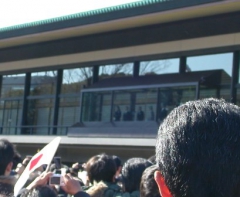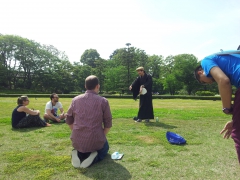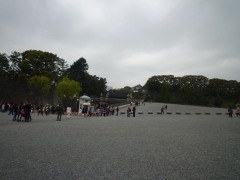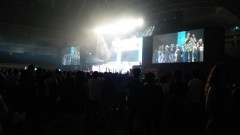15 February 2015
Film"The Butler" Is that a story of Barak Obama?
A story of a man whose father was shot in front of him on the cotton field by a white farmer and later became a house servant of the farmer and then hotel servant and finally was hired by the White House.
It is a fiction but it is based on a real butler who served the White House from 1950's Eisenhower until Reagan's administrations.
It was like Black history of America.
How Black people struggled with the oppression and finally be honoured by the society.
Maybe Obama should have experienced similar things.
In order to change the society, people need to be not only brave but also clever. You cannot just fightback. You might have to get along with majority of the society regardless of their unfair treament of you.
It is a fiction but surprising thing was even in the White House, Afro-Americans were discriminated in salary and positions. It was fixed after Reagan's administration 1980's.
I like that part of America's history, not interested in founding fathers.
It is common with current event happening in Okinawa, Japan.
Because of that, America is no longer my favourite nation.
I can only feel mutuality with the oppressed Afro-Americans who lived in the past.
11:36 Posted in Film, Japan News, Politics, Society, USA issues | Permalink | Comments (0) | Tags: okinawa, racism, history
31 October 2014
Film "Grace of Monaco" Monaco is like the imperial palace in Tokyo
A biographic story of Grace Kelly who left Hollywood when she was a top star and got married to the Monaco Prince.
I remember TV documentary on her life a long time ago. It was her family's philosophy that leaving the business when he or she is on the top ranking. Not letting anyone see you downgrading.
Indeed, she did.
The film was criticized for historical inaccuracies, so it was noted as fiction based on facts.
But I enjoyed the film because Nicole Kidman who played Grace Kelly was really beautiful.
I first learnt that Monaco's official language was French. The kingdom always had struggles with its fearful neighbor, France.
Maybe getting Grace Kelly married to the royal family was one of biggest strategy to secure their kingdom's soverignty.
Monaco never had military but such a big weapon, the world's most famous celebrity so that no one wanted to destroy the kingdom including her.
A country image is a big thing. Japan has monarchy, emperor Akihito and his family.

Their residence is size of Monaco. One family occupied huge area in the capital but they contribute a lot to the nation. Former emperor, late Hirohito was about to be accused of war criminal but the U.S. force did not indite him because of fear of rebellion from his people that might make occupation difficult.
The film made me think about Monaco whenever I go to the imperial palace in my city. Actually I am a guide who escorts foreign travelors to the imperial palace. If you want to know more about the tour, please visit this site.

09:46 Posted in Film, France, Politics, Society | Permalink | Comments (0) | Tags: history, emperor, tokyo, documentary
29 September 2014
Why is she popular?
I could never understand why a girl like her has become so popular internationally.
Her name is Kyary Pamyu Pamyu.
She is like Lady Gaga of Japan. Her sales points are very unique custumes.
But her singing is not music, just high tone voices.
Last Sunday I went to Tokyo Metropolitan Gymnasium. There was a festival of concerts, fashion shows and exhibitions. Those were awesome but the biggest event was her concert in the final session.
What surprised me was there were many audience from abroad including Europeans. Some wore custumes like she wore.
Can they understand and enjoy her singing?
It seems they did.
I can never follow what they are doing.
What is going on in this world? I felt like Alice in the wonderland.
23:05 Posted in Art, Culture, Japan News, Music, Society, Tokyo Life | Permalink | Comments (0) | Tags: music
31 August 2014
Disney's film "Frozen" American culture is replicas of European ones.
The film was released last February. Recently DVD was released so I rented and watched that.
Animated film of famous Andersen story "The Snow Queen." The queen who had magical power which can freeze anything around her and cover her country with snow and then escaped to the top of a mountain. Her sister tried to save her.
It was as good as expected. Great thing is music because it is a musical film. "Let it go" was really great and aspiring.
However, I personally do not like such film. It is just an ordinary story of fairly tale except the prince being evil. I do not like computer graphic animation. It is OK to watch it on TV screen but not in theatre.
Computer graphic animation is very shallow image. Not very substantial.
Furthermore, this film just made me sure that American culture is after all, plastic replicas of European ones.
When we image American scenes of towns, people. Typical ones are very replicas of European ones. Not exactly Europeans but looks newer, modern and cleaner. But replicas are replicas.
Just plastic things with no souls.
When I visited European countries such as England, France, Switzerland and Germany from the U.S. during my college study years in US, 1990's. I felt that very strongly by comparing the two.
Maybe that is good things about America. Not being bound by tradition, and easy to join.
I really like such things in my younger days but not any more, I am over 40.
I want more substantial and traditional things in life.
In fact, America seems not giving good influence on our country like US military bases and global free market economy policies. We should make a distance from the U.S. Not too much being brainwashed by American things.
I do not enjoy replicas any longer but more substantial, real things.
Not easy to find that but I will find ones in order to make my life better.
12:20 Posted in Film, Society, USA issues | Permalink | Comments (0) | Tags: movies, music







